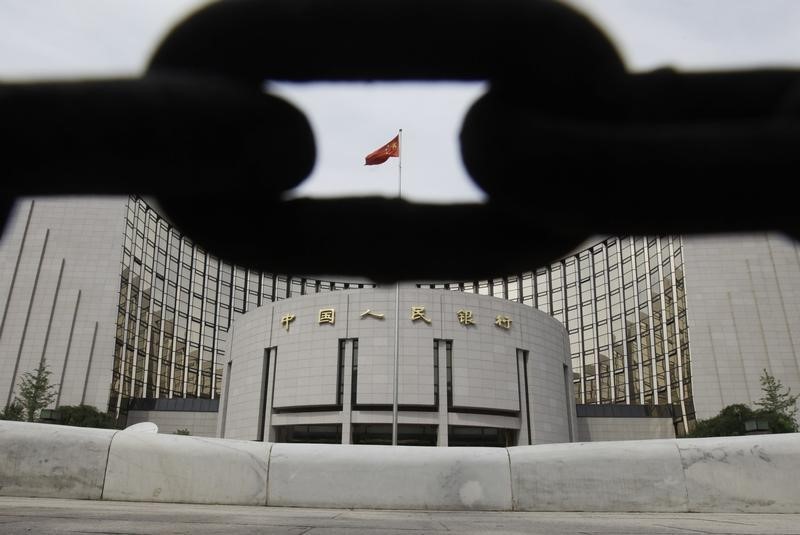By Geoffrey Smith
Investing.com -- China's central bank cut a key borrowing rate for the first time since January, in an effort to boost support for an economy hurt by Covid-19 lockdowns and a deflating property bubble.
The People's Bank of China cut its one-year rate by 10 basis points to 2.65%, after the country's sales and production data for July both fell short of expectations It also trimmed its seven-day reverse repo rate.
Retail sales grew only 2.7% from a year earlier in July, slowing from a rate of 3.1% in June amid continued sporadic outbreaks of Covid-19. The numbers disappointed hopes for an acceleration to 5%. Industrial production, meanwhile, rose only 3.8% on the year, a marginal slowdown from a rate of 3.9% a month earlier, while growth in fixed asset investments slowed to 5.1% on the year, extending what is now a five-month slowdown.
The numbers also followed hard on the heels of weak monetary and credit data on Friday, which showed Total Social Financing, the broadest measure of credit in the economy, falling to its lowest since late 2019.
Taken together, the figures suggest that China will continue to struggle to provide support to much of the world economy for the rest of the year. Base metals and crude oil prices all fell, dragging down commodity currencies such as the Australian dollar and the Russian ruble.
Michael Pettis, an economist with the Carnegie Endowment in Beijing, said via Twitter) that the news contrasts sharply with the PBoC's reluctance so far this year to ease policy while the Federal Reserve has been tightening policy in the U.S. He also argued that the cuts were unlikely to give the economy any real support.
"Businesses and households seem to be cutting back on their borrowing because of their concerns about economic weakness. The problem, in other words, is lack of domestic demand, not expensive capital," Pettis said. "I am pretty sure the PBoC knows this. In the end I think it announced the interest-rate cut mainly because it knows that something must be done, but it doesn't know what else to do."
Chinese stock markets fell broadly in response, with the Shanghai Shenzhen CSI 300 falling 0.2%, and the A Shares index falling 0.4%. The offshore yuan fell 0.5% to 6.7690 against the dollar as of 02:50 ET (06:50 GMT).
"With the PBoC clearly acknowledging the need for more stimulus, investors may start to speculate that the 6.80 ceiling in USD/CNY may not be as strong as it seems," said ING analyst Chris Turner in a note to clients.
Elsewhere on Monday, the woes in China's real estate sector went from bad to worse, with house prices falling 0.9% on the year in July, their biggest annual drop in seven years. That development comes against the background of a widespread buyers' strike, with thousands of borrowers refusing to pay their mortgages due to the inability of cash-strapped developers to finish projects due to their inability to raise any more debt.
